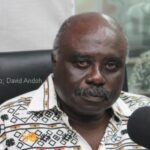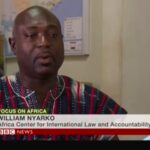First, I commend the Economic and Organized Crime Office (EOCO) and its collaborative partner, the Ghana Anti-Corruption Coalition (GACC) for this historic initiative, being the first time that EOCO is engaging directly with stakeholders and the public since it was established in 1993.
Indeed, in the fight against organized crime and corruption, collaboration is key. The idea of collaboration was at the core of the founding of the GACC in 2001 when state and non-state actors came together to establish the GACC.
It is pertinent to mention that EOCO, a state actor, which was then called the Serious Fraud Office (SFO) was a founding member-organization of the GACC. Another founding member-organization, a non-state actor, was the Ghana Journalists Association (GJA). Having taken part in the discussions which led to the founding of the GACC on account of my being a member of the Governing Board of the Ghana Integrity Initiative (GII), which was also a founding member-organization of the GACC, and recalling the discussions, the media-EOCO collaboration/partnership in the fight against corruption was a key part of the discussions.
Indeed, the need for collaboration between EOCO and the media cannot be overemphasized. The EOCO and the media mutually benefit from the information they publish through their activities. For example, the EOCO utilizes the open source information provided by the media to, sometimes, initiate investigations, an example of this being the EOCO investigations into the GYEEDA case, which was first broken by multiple award winning investigative journalist, Manasseh Awuni Azure of the Multimedia Group Limited, operators of JOY FM.
Similarly, the media also utilize information provided by EOCO by publishing the investigative outcomes of EOCO and reporting on issues related to EOCO’s work.
In addition, there is a convergence of roles in respect of the functional accountability mandate assigned to EOCO and the media under law. Under the Directive Principles of State Policy in Chapter 6, Article 41 (f) of the 1992 Constitution of Ghana, every citizen has a duty:
“To protect and preserve public property and expose and combat misuse and waste of public funds and property.” The media, whose members are journalists and are bound by their duties as citizens, have also been assigned additional responsibilities under Chapter 12, Article 162 (5) to “…uphold the responsibility and accountability of the Government to the people of Ghana.”
Under Act 804, the law which established EOCO, EOCO, whose officers are also citizens of Ghana and have a duty as citizens, are to, among other things, investigate and on the authority of the Attorney General prosecute serious offences that involve financial or economic loss to the state and recover the proceeds of such crimes. For both the media and the EOCO to perform these accountability functions effectively, the investigative functions of investigative journalists and the investigative skills of EOCO officers are key.
In assessing the effectiveness of the partnership/collaboration between EOCO and the media, I will assess this partnership in two periods:
- From 1993 when EOCO was established as the Serious Fraud Office under Act 466 to August 2010; and
- From September 2010 when the SFO was transformed into EOCO to date under Act 804.
To complete my task, I will:
- Highlight EOCO’s successes and challenges in forging effective partnership/collaboration with the media; and
- Make recommendations to enhance efficiency of EOCO-media relations.
EOCO as SFO – 1993 to August 2010
First, let me establish the basis of my assessment, which is in essence disclose my methodology. I base my assessment on insights I gained as a practicing investigative journalist with the Ghanaian Chronicle newspaper from 1995 – 2001; expert interviews with some officials of the SFO/EOCO and journalists (don’t ask me to disclose my sources) and content analysis of publications on the SFO/EOCO.
In using this methodology, I come to the conclusion that during this period – 1993 – August 2010, SFO-media relations were characterized by adversarial posturing towards the media by SFO; the use of leaks than official communications by the SFO and reactive communications.
The content analysis found several instances of leaks unsourced to the SFO. For example, the Ghanaian Chronicle reported in its December 6th, 1999 edition, a very important investigative initiative by the SFO into the Quality Grain matter, which dominated public discourse for nearly a decade. The story titled “SSNIT Under Serious Fraud Office Probe” was unsourced to the SFO or SSNIT.
Fast-forwarded to the late 2000s, the Ghana News Agency (GNA) also quoting unnamed sources at SFO reported on an SFO investigation into what came to be called the Woyome case. The GNA reported, among other things, that the SFO report had been submitted to the Office of the President.
However, there were also instances where SFO communicated directly to the media/public, although much of it was reactive when it felt the need to, especially to clarify issues. For example, then deputy executive director of the SFO, Mr. Theophilus Cudjoe issued a statement denying a Ghanaian Chronicle report on 2nd September, 1997 into an SFO investigation on the Capital Telecom and SDC Investments matter.
During this period, a more proactive and responsive media engagement would have been a better strategy for the SFO to implement.
SFO as EOCO – September 2010 to Date
From the outset, I would say there has been a marked improvement in the relations between the transformed SFO, now EOCO and the media, as demonstrated by increased public engagement and access to information. However, as our primary school teachers will say “there is still room for improvement. Some of the improvement includes:
- The establishment of a public affairs/public education unit at EOCO
- Issuing of advisory statements to the media and public on for example: Menzgold and Loom matters.
- Issuing of press releases and appearances on TV and radio discussions on Joy FM Corruption Watch programs, among others.
Despite this improvement, challenges still remain particularly in accessing information from EOCO. For the majority of the media, they do not know whom to contact at EOCO to comment on or get the side of the story of EOCO. It is not intuitive for a journalist to know the media contact person at EOCO despite the establishment of the Public Affairs Unit.
To be sure, EOCO has a general contact information on its Website but there is no specific media contact person despite there being a general email address and phone numbers to contact EOCO. Several journalists I interviewed who said they had used these general contact points to request information from EOCO reported frustration with getting the requested information in a timely manner.
CHALLENGES
To be sure, EOCO faces one of the key challenges that every state institution that conducts investigation faces- as an investigative body what information should it disclose and when in order not to jeopardize ongoing investigations?
However, this challenge is not unique to EOCO alone. Other investigative bodies such as the Criminal Investigations Department of the Ghana Police Service (CID) and the Commission on Human Rights and Administrative Justice (CHRAJ) face this challenge as well. EOCO can work around it by balancing the public right to know and the preservation of the integrity of ongoing investigations.
RECOMMENDATIONS
As an overarching strategy, EOCO should consider adopting consistent proactive measures and a collaborative approach in its dealings with the media. To this end, it is recommended that:
- EOCO makes its Public Affairs Unit more visible along with their contact information such as direct phone numbers and email addresses to the media.
- EOCO creates a separate page on its website for the media to contact EOCO separate from the general public contacts.
- In line with EOCO’s historic stakeholder engagement, EOCO should provide updates on cases as it deems necessary balancing the public right to know and the preservation of the integrity of investigations. In order for EOCO to share its reports with the public, EOCO must push for the amendment of the provision in Act 804 which provides that it should submit its report to the Attorney General.
- EOCO in collaboration with the media provides capacity building to journalists including Editors and investigative reporters on EOCO’s work. Such capacity building events could be deployed at Press Soirees for editors who don’t have much time and a one-day/two-day training events for mid-career reporters/journalists.
- EOCO enhances its outreach through the use of social media platforms.
Mr. William Nyarko, Executive Director, Africa Center for International Law and Accountability (ACILA) presented this assessment of EOCO-Media relations at a stakeholder engagement on the activities of the Economic and Organized Crime Office held on July 10, 2019 in Accra.








